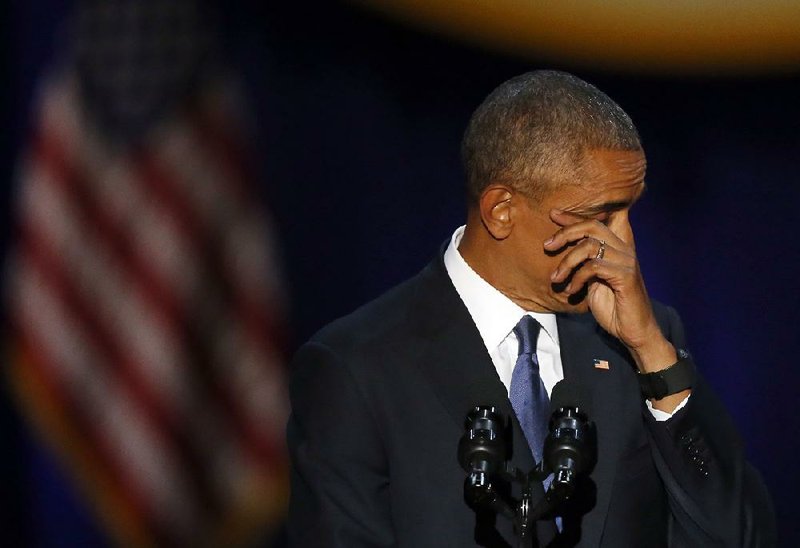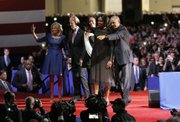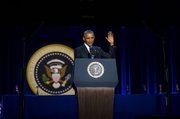CHICAGO -- President Barack Obama bid farewell to the nation Tuesday night in an emotional speech that sought to comfort and encourage a country on edge over economic changes, persistent security threats and the election of Donald Trump.
RELATED ARTICLE
http://www.arkansas…">Comey mum on Russian inquiry
Obama's valedictory speech in his hometown of Chicago was a public meditation on the trials and triumphs, promises kept and promises broken that made up his eight years in the White House. Arguing that his faith in America had been confirmed, Obama said he ends his tenure inspired by America's "boundless capacity" for reinvention, and he declared: "The future should be ours."
His delivery was forceful for the most part, but by the end he was wiping away tears as the crowd embraced him one last time. He and wife, Michelle, hugged former aides and other audience members long after the speech ended.
Reflecting on the corrosive recent political campaign, Obama said America's great "potential will be realized only if our democracy works. Only if our politics reflects the decency of our people. Only if all of us, regardless of our party affiliation or particular interest, help restore the sense of common purpose that we so badly need right now."
He made only passing reference to Republican Trump, who will replace him in just 10 days. But when he noted the imminence of that change and the crowd began booing, he responded, "No, no, no, no, no." One of the nation's great strengths, he said, "is the peaceful transfer of power from one president to the next."
Earlier, as the crowd of thousands chanted, "Four more years," he simply smiled and said, "I can't do that."
Obama, the nation's first black president, turned his focus on race relations in the country, saying that talk of a post-racial U.S. after his 2008 election may have been well-intended, but it "was never realistic." He said he's lived long enough to know that race relations are better than they were 30 years ago. But he said he also knows "we're not where we need to be."
He said every economic issue can't be framed as a simplistic struggle between the middle class and those less worthy, and said that forsaking the children of immigrants will diminish the prospects of American children.
He quoted To Kill a Mockingbird's Atticus Finch, who said that to understand a person, it helps to "climb into his skin and walk around in it."
Acknowledging that his vision for the country will exit the White House with him, Obama blasted "zero-sum" politics.
"If every economic issue is framed as a struggle between a hardworking white middle class and undeserving minorities, then workers of all shades will be left fighting for scraps while the wealthy withdraw further into their private enclaves," Obama said. "If we decline to invest in the children of immigrants, just because they don't look like us, we diminish the prospects of our own children -- because those brown kids will represent a larger share of America's workforce."
End at the beginning
For his final speech, Obama returned to the city that began his political career to bring his eight years as president to a close. His speech at Chicago's McCormick Place marked his last chance to define what his presidency meant for the United States.
It was in Chicago in 2008 that the nation's first black president declared victory and where, over the years, he tried to cultivate his brand of optimism in U.S. politics.
The president arrived in Chicago in the evening joined by an array of long-serving White House advisers and people from his past, including sister Auma Obama from Kenya. Michelle Obama, daughter Malia and family friends came along for what the White House said was Obama's 445th mission aboard Air Force One. Absent was the Obamas' younger daughter, Sasha. The White House didn't explain the absence.
A president who rode on promises of hope and change to the Oval Office delivered a final speech to the country built around the need to confront a changing world and nation.
Obama urged the country to deal with the persistent problems that undermine the equality, diversity and unity that he sought to achieve during his tenure. He said economic inequality would continue to cause "disaffection and division" and warned that race would remain a potent force dividing the nation unless discrimination is attacked and eliminated.
"But laws alone won't be enough. Hearts must change," he told the crowd. "When minority groups voice discontent, they're not just engaging in reverse racism or practicing political correctness; that when they wage peaceful protest, they're not demanding special treatment, but the equal treatment our founders promised."
He urged members of both political parties to work to restore trust in society's institutions in ways that will attract more people to become involved in the country's fate.
"If something needs fixing, lace up your shoes and do some organizing," Obama, a onetime community organizer, told the crowd. "If you're disappointed by your elected officials, grab a clipboard, get some signatures, and run for office yourself. Show up. Dive in. Persevere. Sometimes you'll win. Sometimes you'll lose."
But, he added: "More often than not, your faith in America -- and in Americans -- will be confirmed."
Obama said he had committed to ensuring Trump "the smoothest possible transition," drawing boos from a crowd clearly not ready to see that happen.
Tearing up as he concluded, Obama thanked his wife, his daughters, his vice president ("the scrappy kid from Scranton") and the army of supporters who helped him reach into the White House.
"I won't stop; in fact, I will be right there with you, as a citizen, for all my days that remain," Obama pledged, fighting back emotion as audience members rose to their feet. He asked them to believe, as they did during his first campaign. "Yes, we can. Yes, we did. Yes, we can."
Speaking to all
White House officials said they approached Obama's final speech differently from any other.
Determined not simply to recite a history of the past eight years, Obama directed his team to craft an address that would feel "bigger than politics" and speak to all Americans -- including those who voted for Trump.
His chief speechwriter, Cody Keenan, started writing it last month while Obama was vacationing in Hawaii, handing him the first draft on the flight home. By late Monday, Obama was immersed in a fourth draft, with Keenan expected to stay at the White House all night to help perfect Obama's final message.
Ahead of his speech, Obama acknowledged that the chaos of Washington makes it easy to lose sight of the role U.S. citizens play in democracy. He said that while he leaves office with his work unfinished, he believes his administration made the U.S. "a stronger place for the generations that will follow ours."
Seeking inspiration, Obama's speechwriters spent weeks poring over Obama's other momentous speeches, including his 2004 keynote at the Democratic National Convention and his 2008 speech after losing the New Hampshire primary to Hillary Clinton. They also revisited his 2015 address in Selma, Ala., that both honored America's exceptionalism and acknowledged its painful history on civil rights.
Former aides were brought back to consult on the speech, including advisers David Axelrod and Robert Gibbs, and former speechwriter Jon Favreau, said the officials, who requested anonymity because they were not authorized to publicly discuss the private discussions.
With his impending exit, Obama is ramping up planning for his post-presidency. He hired his White House political director, David Simas, as the chief executive officer of his foundation. His foundation has said that a training center for grassroots organizing will be part of his presidential library, and he also plans to partner with former Attorney General Eric Holder to promote an overhaul of congressional redistricting. Some administration officials may also join the president's Chicago-based political committee, Organizing for Action, which grew out of his successful presidential campaigns.
In his hometown of Chicago, the prospect of witnessing Obama's last presidential address brought thousands out in single-digit temperatures over the weekend in hopes of securing tickets. They showed up well before sunrise and waited in lines that stretched for blocks.
Information for this article was contributed by Josh Lederman and Darlene Superville of The Associated Press; by Justin Sink of Bloomberg News; and by Mark Landler of The New York Times.
A Section on 01/11/2017


